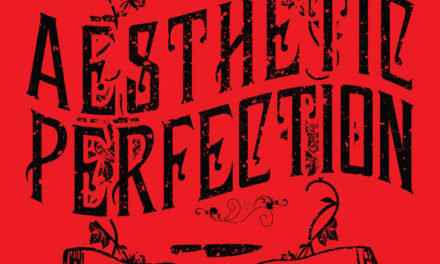If you’ve never read one of our In Conversation pieces, it’s pretty much exactly what it sounds like: the Senior Staff take a record or other piece of art from the spectrum of Our Thing, and give it a good chewing over. Less formal and more personal than our reviews, it’s usually a chance to compare notes and really dig in on something we have a lot to say about, while also allowing us a bit more latitude in how we discuss things. For our first In Conversation of 2019, we’re listening to a fraught new record by an artist we’ve spent a lot of time talking about in this series before…

Rome
Le Ceneri Di Heliodoro
Trisol
Bruce: A new Rome album almost always portends the two of us taking a pretty deep dive into headier waters than usual, but this time things feel a little different. Pre-release talk surrounding Le Ceneri Di Heliodoro initially focused on Rome’s apparent return to roots neo-folk (if such a contradictory term actually means anything), and as I imagine we’ll end up discussing, in many musical ways Jerome Reuter’s twelfth original LP is closer to the established sound of neo-folk than any other. However, with that musical shift came the clouds of political ambiguity (at best) which have always enshrouded neo-folk. The slogan on a new t-shirt (“Every act of beauty is a revolt against the modern world”) is commonly credited to Julius Evola, Rome’s social media reposted favourable comparisons of the record to the work of Gabriele D’Annunzio, and the slogan on yet another shirt (“Screw the rest – the West knows best”) seemed to be an overt endorsement of the sort of imperialism Rome’s work had always critiqued. Sure, the album’s title was interpreted by some as a nod to Pasolini’s “Le ceneri di Gramsci” – a peaen to a decidedly leftist figure – but it’s just this sort of political dog-whistling which has allowed neo-folk to become a musical form of Russian roulette (every sixth band has a fascist in the chamber), and which Rome has consistently taken action against in the past.
All of this is to say that by the time the album finally arrived at my door (in a characteristically deluxe vinyl edition), I had a hitherto unimaginable concern – that good old Republican-upping Jerome Reuter had taken a decidedly dodgy political return in recent years. After spending some time with the record I’m relieved to find those concerns abated, though I’m still a bit perplexed by some of the tactics taken in a record seeking to address the decline of European and American hegemony. I feel a bit bad jumping right into the political side of the record while barely discussing its musical dimensions, but because Rome is a band that I’ve loved for over ten years for reasons well beyond their music I felt it best to get our concerns out in the open as soon as possible. Knowing that your pre-release questions about Le Ceneri Di Heliodoro more or less mirrored mine, how did listening to the actual record answer them?
Alex: It was fraught to be honest, and it has taken a lot of listens to get where I’m at. The current climate demands a lot of rigor in examining quotes and allusions like the ones you mentioned and knowing going in that I was going to have be brutally honest about whether one of my favourite living songwriters had gone crypto-fascist (an idea that seemed insanely unlikely and yet had to be considered) was difficult and coloured the experience a lot. Jerome is a smart enough artist to understand what invoking Evola is going to entail in terms of how people perceive the record. He’s not a stranger to talking about problematic philosophers (see “Celine in Jerusalem” for a relatively recent example) but the rise of neo-fascism on a global scale makes it a dangerous game to play. And like, Jerome was living in Italy when he made the record, he’s not blind to what’s going on there and what it means more broadly for Europe.
All this is to say to that my biggest disappointment with Le Ceneri Di Heliodoro is how much Jerome plays to the middle on it, and how toothless a lot of its critique is. Like you, I feel like he set out to write an album about the death throes of Europe and the US as we’ve known them to exist and what that has fomented politically and culturally. It’s big stuff, worthy of examination, but given the weapons-grade provocative way he’s chosen to frame the album I’m left feeling unsatisfied. I trust him as an artist implicitly, he’s earned that level of respect from me, but when you’re making long-time fans question if you’ve made a heel-turn by virtue of your presentation and framework (lest the reader think it’s just Bruce and I, this has been an ongoing and heated topic of discussion on our Slack for months and we have received more than a few e-mails about it from folks asking that very question) I need more than the baseline level of irony that pervades a lot of the record. To wit, actual fascists flourish through presenting themselves ambiguously, and seeing an artist I genuinely love occupy that same space to the point people have mistaken it for an actual right-wing about face doesn’t feel good. Provocative is good and fine, but at a certain point the methods he’s chosen have eclipsed everything else.
Which is a shame because I think musically the record is really excellent, once I got past wondering about what exactly it was trying to say (or avoid saying openly). So Mrs. Lincoln, aside from that, how did you enjoy the album?
Bruce: As much as the album art and extended Roman metaphors obviously pointed to the origins of neo-folk, I was struck by just how folk – forget the prefix – this record is. The martial drumming certainly calls back to the first iteration of Rome, the clean yet echoing strumming on tracks like “A New Unfolding” reminds me of Flowers Of Exile, and the pained, tooth-gnashing vocals of “Who Only Europe Know” seem to be carried over from Hall Of Thatch. But the jaunty horns on “One Lion’s Roar”, paired with woodwinds on “Black Crane” (the latter’s guitar conjuring R.E.M. via Cult Of Youth) and plenty of other sounds are bringing me back to the folk festivals and records which were a formative part of my childhood. This very much jibes with Reuter’s overarching musical journey; even when he’s making conscious callbacks to the industrial sample pastiche of his earliest work or making detours into a particular theme, each of his albums speaks to a much more sublimated use of genre markers as he becomes more and more adept a singer-songwriter, whatever one might take that most nebulous of terms to mean.
Despite having grown up on Pete Seeger and Woody Guthrie I’m hardly an adept theoretician of folk, but I think that one of its defining characteristics is a dynamic between specificity and universality. The roots of a particular piece of folk music, from its historical origins to the commonplace instruments people had at hand in that place and time, should be apparent to the listener from the outset (a vouchsafement of its ‘authenticity’, of course), and yet we imagine that its message and spirit is one that can be understood by any people in any time, even if the specifics of metaphor or proper names elude us. It’s through those mechanisms that we recognize, say, the biblical parables used in spirituals as having special resonance to those enslaved. So the idea of using the fall of Rome as a means of thinking about the current political climate certainly makes sense, even if I think the execution misses the mark at times. In a way it’s telling that Reuter has never engaged as fully with his project’s namesake as he does here. It really does seem like a “break glass in case of emergency” type option, but certainly one I can’t fault him for exercising now. What’s your take on how the music itself pairs with the lyrical themes?
Alex: Well, I think maybe the most obvious place that the record’s sonics and its themes meet is on “The West Knows Best”, which has some spaghetti western (which, note, is an Italian invention meant to evoke America) twang to accompany its lament for/contemptuous dismissal of America as cultural arbiter of the world. It’s also delivered vocally with a mixture of faux mourning and veiled disgust that’s actually kind of impressive from a performance standpoint. A bit less successful is “Fliegen Wie Voegel”, which is sort of an anthem to WWII fighter pilots, which can be deliberately read as being about The Allies or The Axis, but has a maudlin streak to its rising horns and strings that’s a little tough to manage. I suppose you can read it as a meta-commentary on how those sorts of paeans are only defensible in the eye of the beholder – Sabaton can release whole albums about the sacrifices of American GI’s, but a band doing the same about the Luftwaffe wouldn’t be welcome on most stages anywhere – but I don’t know if that’s much of a point to make. I’m trying my best not to assign bad centrist views to this record, but it kind of plays that way a lot of the time despite my efforts.
Which brings me to a point I wanted to ask you about: I’m not even sure how much of ANY of this stuff that’s sticking out to me is even new to Rome as a project. He’s always played with martial imagery, and specifically written about EUROPE as an idea in ways that could be pretty fraught. It never seemed like a problem in the past, maybe because his catalogue is so filled with albums that indicate a deep respect for anti-fascists (and on A Passage to Rhodesia an unsympathetic examination of the hubris of the colonialist) that there wasn’t a need to question his politics and what specifically he was saying, as his intentions could be assumed to be righteous. And I want to believe that they still are, and I guess I kind of do. But the world is different in 2019, and I think people like us have become so hyper-aware of how actual dyed-in-the-wool-piece-of-shit fascists get away with operating in the open that stuff we used to not blink at, or could shrug off troubles us now. I think Jerome is using a neo-folk genre playbook to make a point of some kind, but it’s a god damn weird time to be doing that. Is the problem that Rome didn’t change, but we did? And maybe a string of very personal records insulated us from making that realization sooner?
Bruce: Sure. And I’m very much willing to admit that the ways in which we’ve changed as listeners in the past few years has been changed by circumstance as well. It’s easy to lapse into comfortable and familiar aesthetic frameworks as consumers of culture. Bertolt Brecht, that most tactically savvy aesthetic revolutionary who receives shout-outs on Le Ceneri as he has on previous Rome records, recognized that it was the duty of the artist to disrupt those established habits. And it’s certainly possible to read the record’s close examination of reactionary populism as an attempt to point out the danger of its allure, yet as Blake pointed out, it’s very easy to be of the devil’s party without knowing it. I mean, I legitimately admire the subtlety and craft of “Who Only Europe Know”‘s refrain – how can you claim an essential identity when your own provincialism has kept you from reflecting on that identity from without – but sadly I feel it’s too clever an approach by half in 2019, and far too easy to misinterpret the “What do they know of Europe?” riposte as being directed towards the modern day versions of the immigrants targeted by Enoch Powell, who is of course also referenced in the song. I mean, some cursory digging on my part found alt-right goons celebrating the aforementioned “The West knows best” shirt as an indicator that an artist they’d always taken to be an ideological enemy as one of their own, and that’s heartbreaking.
There’s a whole muddle of factors mitigating our reaction to Le Ceneri Di Heliodoro: Reuter’s decision to lift rhetoric from across the political spectrum with cagey ambiguity, the whole thorny history of neo-folk’s political leanings, our own subjective histories with Rome as a project, and perhaps most importantly, the resurgence of the far-right from America to Brazil to the Philippines to the UK. Obviously the latter three elements are well out of Reuter’s control, but to exercise the first given the last is, as you say, ill-timed at best and offering succor to the far-right at worst. I’m only banging on about this so loudly because of the respect Reuter and his work have earned from me over the years, and again, I can even respect what I can discern of Le Ceneri Di Heliodoro‘s aims, even if I ultimately find its methods unsound. Final thoughts?
Alex: I’m gonna be very, very interested to see how our perception of this one fares with time. Inasmuch as I think its ideological faults prevent me from being able to enjoy it as a listening experience now, it may well age into an interesting if flawed document of the time it was made and where Jerome Reuter was at creatively. Like I said, it’s musically pleasurable to listen to, and a more time spent with it may dampen some of the issues that have kept us from being able to get with it critically and emotionally. I’ve been a vocal fan and supporter of this project for ages, and that gives me a lot of reasons to want to find the good in it, while being absolutely unable to separate it from its faults. Le Ceneri Di Heliodoro is a complicated record to parse, and to be frank I’m kind of exhausted with it at this point. Time and distance (and I think whatever Jerome chooses to do next) will ultimately govern where my final stance is on it, but for now I’m filing it under “problematic”.
I’m not gonna call it a misstep because I’m not convinced it’s not exactly what it was envisioned to be, but I think for the first time ever Rome may have made an album whose philosophical and ideological foundations simply can’t support the weight of the ideas it engages with.






Thank You very much for taking the time and care to discuss this. I was one of the readers that when read the quote from Evola was concerned.
In total agreement. I’m really wondering, with the rising tide of far right politics, has the time for artistic ambiguity when dealing with these sort of issues perhaps passed? (If there ever truly was one, I can’t quite decide)
Whatever JR was motivated by, there’s a lot here that’s irresponsible at best. The alt-right boneheads patting themselves on the back while listening to this record are case in point.
I for one don´t think Reuter is being ambiguous at all. There are no fascist dog whistles here. In fact, “The west knows best” seems to be one of the more overtly anti-imperialist and probably anti-american songs i´v heard in a long time. As to Reuters own motivations and his lyrical content on the new album he sums it up quite nicely here: https://www.aristocraziawebzine.com/en/interviews/rome-interview/
Actually i´m a but surprised by this “In conversation”. I have always come to expect a high, albeit accessible, intellectual level from you two. This conversation was neither. Muddled suspicions and sloppy accusations without any sign that you really have delved into the material in a meaningful way.
I think we made it fairly clear we did not feel Jerome was going over to the right, but that the ideas he was using and the way he used them could be read that way. I think the fact that there are people on the right interpreting the record as sympathetic to their views bears that out, regardless of Jerome’s intentions.
Jerome’s fashioned himself a set of panpipes out of niche dog whistles on this one. You’ve got a twist of Mussolini, a dash of Evola and a big old dollop of whatever on earth “I found my nation in the legion” is meant to make us feel.
We can politically spelunk Whether Or Not He means It as much as we like, or argue about whether or not I’m right about whether Uropia O Morte is a callback to the slogan for the March on Rome – but the meat of the matter is how it’s going to be received by actual Nazis. They will receive it gladly, and well. Cursory internettal frolics proves this is already the case. In an age when you’ve (we’ve) got actual fascists happening, any ambiguity can be interpreted as endorsement, and Jerome’s just done the lyrical equivalent of spilling Fanta near some fascist ants. I like to listen to this record (it’s got some bops) but I imagine going to a gig and being amongst people willing to hoot along with some of these lyrics and my obviously queer crushable self gets pretty frightened. Come on, Jerome! Don’t do us like this!
Can I just say, your tears are fucking delicious
“Dies ist keine richtung – nur reine bewegung” – “I found my nation in the legion” – Pure Movement. Camaraderie without timeworn ideological pigeonholes. An Empowering Unity of a New Kind. The Aesthetic of Tradition set free from the burden of the old. Nods to the left, nods to the right – a balance for unified choruses… As a long-time neofolk aficionado I’m getting sick of this kind of art, especially set in current political context. There is a need for solidness, an (European) identity and tradition; the warmth of which resounds from Rome. And as ever before, fascism grows again on liberal ambiguity, the fuzziness of unity.
I think the greatest take Jerome made about this album is that “people are scared of the Left and scared of the Right, and noone has the answers”. Personally I think it’s peabrained to not be able to evaluate the need for new takes which are centrist in nature and address the very real problems the scary “alt-right” are the only ones talking about. Identity for Europe is extremely important, and our children need to be able to recognise the same charm their countries had before their “holy flame”. At the same point the “poor sick and tired” mass flows of lost people from the third world needs to be addressed properly and sustainably. Which the left and the right both currently both seem to only throw neoliberal solutions at such as making arguments that they are “good for GDP” or “bring nice food”.
New conversation is needed and this album offers a new perspective.
Real Fascists are going to latch onto whatever they can. As an American who just listened to The West Knows Best, it should be pretty clear what any informed listener should take away regarding political views. Anti-American, anti-Nationalist, and anti-West. I think you guys have become incredibly oversensitive concerning some vague far-right threat. Nationalism, at least in America, does not equal Fascism. We are not, never have been, and thankfully never could be an ethno-state. If you guys want to paint the populist and nationalist movements of Europe (where “nation” and “volk” have at times been equated in the past, unlike the US) as “Fascist” is up to you, but do not bring America into this. We have so few actual Fascists here that Antifa has to attack regular, old-fashioned Conservatives. If real Facists latch onto Rome, it is just further proof of how moronic they typically are. While the presumtious arrogance of telling America that we are finished and should “roll over,” pisses me off and keeps me from ever being a fan, I can appreciate Reuter’s skill in the use and communicating of ideas which is really what art is all about.
this comment did not age well at all.
I’m politically far right and I’ve always liked Rome. I like Rome because the music is good. The bands lyrics neither strengthen or weaken my political views. It’s purely for entertainment and enjoyment.
A stealthy ally or a secret enemy. Don’t you think the riddle adds a challenge to the music? I wonder if there are any similar ambiguities on the Republican-upping Flowers For Exile for people willing to see them.
I think the greatest take Jerome made about this album is that “people are scared of the Left and scared of the Right, and noone has the answers”. Personally I think it’s peabrained to not be able to evaluate the need for new takes which are centrist in nature and address the very real problems the scary “alt-right” are the only ones talking about. Identity for Europe is extremely important, and our children need to be able to recognise the same charm their countries had before their “holy flame”. At the same point the “poor sick and tired” mass flows of lost people from the third world needs to be addressed properly and sustainably. Which the left and the right both currently both seem to only throw neoliberal solutions at such as making arguments that they are “good for GDP” or “bring nice food”.
New conversation is needed and this album offers a new perspective.
Message to the author
Quit convulsing and just appreciate the art that’s being shared with you. You people do this with everything that is attempting to be genuine with you as an audience member. Every time something peeks your interest whether it is a set of novels or a genera of music you assume it should bolster you’re preexisting biases and when it’s meaning is ambiguous or even subjective. Rather than condemning it and moving on or just enjoying the experience you try to hollow it out and fill it with your own biases by complaining about the part you don’t understand and the interpretation of others… Stop! Your devaluing our art and high culture in it’s most direct sense.
There’s something that’s near transcendence in these works he’s made that speaks for itself. Whoever Jerome decides to agree with on any give subject matter vaguely alluded to, is not the point of these songs. There to provide a type of experience without context like any piece of high art. It’s somewhat magical and should be left to experimentation without vapid “He likes me more” articles condemning the listeners.
You’re really shallow and fake deep and not in the noble proletarian folkish sense.
Imagine me giving a fuck what a literal Nazi sympathizer thinks.
Does that make you Bruce And Alex Nazi Sympathizers for owning and even listening to these problematic records? When are you going to burn them all to prove your solidarity for the current cultural revolution comrades?
I hate actual fascism and white supremacy but I’ll damned if I become a Communist bootlicker.
I’m not calling him a Nazi sympathizer because he likes Rome, I’m calling him a Nazi sympathizer because he has actual videos on youtube sympathizing with Nazis